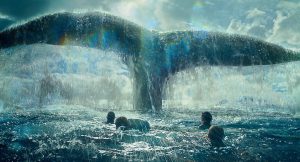In the Heart of the Sea
Posted on December 10, 2015 at 5:36 pm

Herman Melville’s Moby Dick is a brilliant novel about humanity, nature, obsession, power, and pretty much everything else, with a lot of technical information about whaling thrown in for good measure and metaphor. Nathaniel Philbrick’s acclaimed book about the tragic real-life whaling expedition that inspired Melville to write Moby Dick is In the Heart of the Sea: The Tragedy of the Whaleship Essex
. This film is director Ron Howard’s uneven attempt to give that story the mythic force of Melville’s tale (itself never adequately adapted for film).
Like Moby Dick, this is a story of man against nature, not just the powerful animals man tries to trap and kill but of man against the animalistic elements of his own nature. That is represented, as it so often is, by the conflict between two men. The captain of the Essex is George Pollard (Benjamin Walker). He and everyone on the shop know that he is captain only because he comes from a high-born shipping family. The first mate is Owen Chase (Chris Hemsworth, with his “Rush” director), resentful of Pollard because he was promised the captain job and knows he is more qualified.
On the first night out, Pollard makes a point of cruelly describing Chase’s father’s time in prison to establish his superiority — and his willingness to use humiliation as a management tactic. In his desperation to establish his superiority, he does not realize that it makes him look thuggish and scared. It certainly does not inspire respect or loyalty. But Chase is determined to make it work. This time, if he meets his quota, he has it in writing that his next voyage will be as captain.
The whalers are under enormous pressure. Whale oil powers the world of the 1820’s (there is a clumsy hint that the world may be shifting to fossil fuels). Whaling ships go to sea for years at a time, traveling across the Atlantic to kill whales, extract the blubber, and melt it down.
Ships — whether on water or in space — are ideal settings for stories because they are isolated from the society at large. Everything is heightened because there is no way to leave and no recourse for support or appeal. But that intensity and drama is dissipated here with a useless framing story as author Melville (Ben Whishaw) tries to get the ship’s only survivor (Brendan Gleeson) to tell him what happened. The connection is awkwardly positioned against Moby Dick‘s narrative voice and unforgettable Job-like status as the sole survivor who can carry the story and the survivor character’s sympathetic wife is a distraction and her scenes suggest after-the-fact re-shoots.
Melville was wise to reshape the story. This version has gorgeous scenery, a moving score by Roque Banos, and superb special effects, but the power of the images is undercut by a story that tries to carry more meaning than it can hold.
Parents should know that this is a whaling saga with constant and intense peril and violence including fire, guns, storms, starvation, murder, cannibalism, and sinking ship, many characters injured and killed, brief strong language, and drinking and alcoholism.
Family discussion: Why did Pollard embarrass Chase on the first night out? What were the biggest differences between Pollard and Chase in the way they treated the men? Do you agree with Chase’s “abominable” decision?
If you like this, try: “The Perfect Storm” and Melville’s Moby Dick
